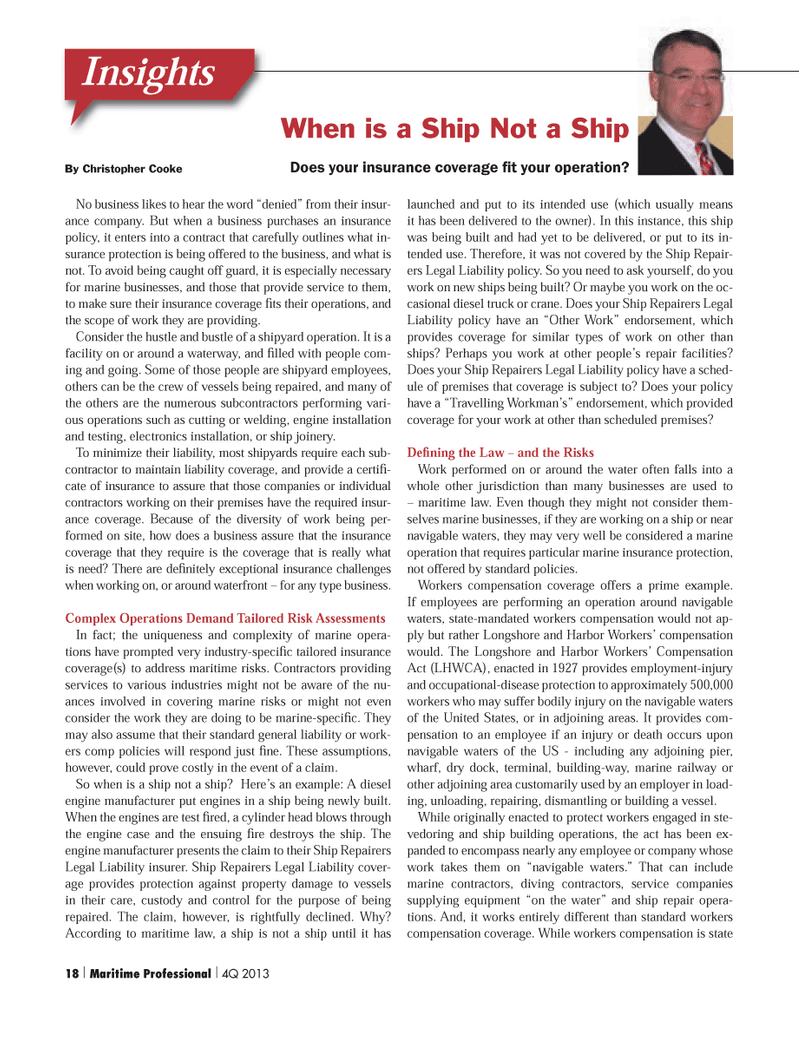
Page 18: of Maritime Logistics Professional Magazine (Q4 2013)
Shipbuilding, Repair
Read this page in Pdf, Flash or Html5 edition of Q4 2013 Maritime Logistics Professional Magazine
No business likes to hear the word ?denied? from their insur- ance company. But when a business purchases an insurance policy, it enters into a contract that carefully outlines what in- surance protection is being offered to the business, and what is not. To avoid being caught off guard, it is especially necessary for marine businesses, and those that provide service to them, to make sure their insurance coverage ts their operations, and the scope of work they are providing. Consider the hustle and bustle of a shipyard operation. It is a facility on or around a waterway, and lled with people com- ing and going. Some of those people are shipyard employees, others can be the crew of vessels being repaired, and many of the others are the numerous subcontractors performing vari- ous operations such as cutting or welding, engine installation and testing, electronics installation, or ship joinery. To minimize their liability, most shipyards require each sub- contractor to maintain liability coverage, and provide a certi -cate of insurance to assure that those companies or individual contractors working on their premises have the required insur- ance coverage. Because of the diversity of work being per- formed on site, how does a business assure that the insurance coverage that they require is the coverage that is really what is need? There are de nitely exceptional insurance challenges when working on, or around waterfront ? for any type business. Complex Operations Demand Tailored Risk Assessments In fact; the uniqueness and complexity of marine opera- tions hav e prompted very industry-speci c tailored insurance coverage(s) to address maritime risks. Contractors providing services to various industries might not be aware of the nu- ances involved in covering marine risks or might not even consider the work they are doing to be marine-speci c. They may also assume that their standard general liability or work- ers comp policies will respond just ne. These assumptions, however, could prove costly in the event of a claim. So when is a ship not a ship? Here?s an example: A diesel engine manufacturer put engines in a ship being newly built. When the engines are test red, a cylinder head blows through the engine case and the ensuing re destroys the ship. The engine manufacturer presents the claim to their Ship Repairers Legal Liability insurer. Ship Repairers Legal Liability cover- age provides protection against property damage to vessels in their care, custody and control for the purpose of being repaired. The claim, however, is rightfully declined. Why? According to maritime law, a ship is not a ship until it has launched and put to its intended use (which usually means it has been delivered to the owner). In this instance, this ship was being built and had yet to be delivered, or put to its in- tended use. Therefore, it was not covered by the Ship Repair- ers Legal Liability policy. So you need to ask yourself, do you work on new ships being built? Or maybe you work on the oc- casional diesel truck or crane. Does your Ship Repairers Legal Liability policy have an ?Other Work? endorsement, which provides coverage for similar types of work on other than ships? Perhaps you work at other people?s repair facilities? Does your Ship Repairers Legal Liability policy have a sched- ule of premises that coverage is subject to? Does your policy have a ?Travelling Workman?s? endorsement, which provided coverage for your work at other than scheduled premises? DeÞ ning the Law Ð and the Risks Work performed on or around the water often falls into a whole other jurisdiction than many b usinesses are used to ? maritime law. Even though they might not consider them- selves marine businesses, if they are working on a ship or near navigable waters, they may very well be considered a marine operation that requires particular marine insurance protection, not offered by standard policies. Workers compensation coverage offers a prime example. If employees are performing an operation around navigable waters, state-mandated workers compensation would not ap- ply but rather Longshore and Harbor Workers? compensation would. The Longshore and Harbor Workers? Compensation Act (LHWCA), enacted in 1927 provides employment-injury and occupational-disease protection to approximately 500,000 workers who may suffer bodily injury on the navigable waters of the United States, or in adjoining areas. It provides com- pensation to an employee if an injury or death occurs upon navigable waters of the US - including any adjoining pier, wharf, dry dock, terminal, building-way, marine railway or other adjoining area customarily used by an employer in load- ing, unloading, repairing, dismantling or building a vessel. While originally enacted to protect workers engaged in ste- vedoring and ship building operations, the act has been ex- panded to encompass nearly any employee or company whose work takes them on ?navigable waters.? That can include marine contractors, diving contractors, service companies supplying equipment ?on the water? and ship repair opera- tions. And, it works entirely different than standard workers compensation coverage. While workers compensation is state When is a Ship Not a ShipDoes your insurance coverage Þ t your operation? By Christopher CookeInsights18 | Maritime Professional | 4Q 2013MP #4 18-33.indd 18MP #4 18-33.indd 1812/11/2013 1:04:12 PM12/11/2013 1:04:12 PM

 17
17

 19
19
